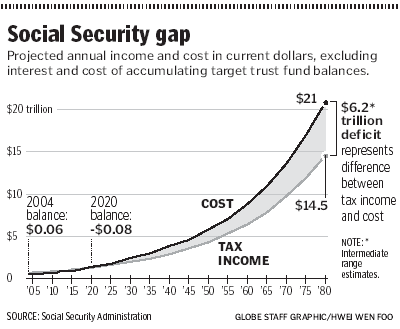Can we agree that this….

…is a problem? Because the reality is worse. As Robert Samuelson notes in today’s WashPost, “It’s more than Social Security”:
Our national government is increasingly a transfer mechanism from younger workers (i.e. taxpayers) to older retirees. In fiscal 2004 Social Security ($488 billion), Medicare ($300 billion) and Medicaid ($176 billion) represented 42 percent of federal outlays. Excluding spending that doesn't go to the elderly, the Congressional Budget Office crudely estimates that these programs pay an average of almost $17,800 to each American 65 and over. By 2030 the number of elderly is projected to double; the costs will skyrocket.In article about the challenges of President Bush’s second term, The Economist also gives warning on the explosion of Medicare spending:

These numbers can be hard to interpret, but the larger point is that Social Security is on an unsustainable trajectory, one that goes well beyond the retirement of the baby-boomers. It is not an immediate “crisis”. In fact, payroll-tax revenues will exceed pension payments until 2018, masking America's overall fiscal imbalance. Nor is it America's biggest long-term fiscal problem. The financial burden from Medicare will be much bigger (see chart 2). Mr Bush's first-term decision to introduce a prescription-drug benefit for retirees worsened Medicare's long-term financial imbalance by more than twice as much as the entire Social Security problem. Nonetheless, Social Security needs fixing. And that means either boosting revenues (for instance, by raising payroll taxes) or reducing promised benefits.My supply of homespun metaphors to describe the entitlements problem is lower than a doodlebug in Aunt Tilly’s root cellar: the iceberg ahead, the pyramid scheme, generational war, the termites eating your house, etc. Washington can agree to face the problem now or it can fall back on political grandstanding and demagogic innumeracy.
1 comment:
The good news on medicare is that there are easy savings to be had. Medical care is an IT mess with lots of paper forms increasing costs. There's a 10 year IT initiative that the Bush administration is pushing that will capture a lot of savings that aren't in any of today's projections. Furthermore, nobody really understands exactly how many "belt and suspenders" tests and extra opinions are being paid for to stave off the lawyers. Tort reform is going to shrink a lot of that.
Finally, I think that nobody's accurately accounting for substitution effects. People who would have gotten very expensive surgery under old style medicare are going to get medically managed with pills in the new regime. That sort of effect isn't well measured in government budgeting if it's measured at all.
Post a Comment